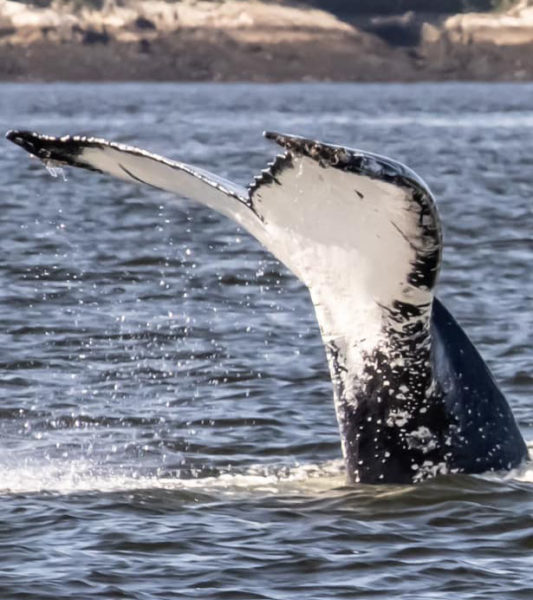
Shooting from a boat using a zoom lens, Westport Island photographer Dee Dow took this photo of the humpback whale recently seen swimming in the Sheepscot River. Dow saw the animal on two separate occasions during its recent visit to Wiscasset village area. “It was amazing,” she said. I have talked about going on whale watch before because I’ve never seen one.” (Photo courtesy Dee Dow)
Some Wiscasset residents and visitors may be relieved to learn they can, in fact, believe their eyes. That was indeed a humpback whale seen swimming in the Sheepscot River near Wiscasset Thursday, Aug. 24.
The rare sighting attracted attention from state and regional media outlets and prompted a flurry of interest from local photographers, who captured dozens of pictures and videos of the animal.
Wiscasset Town Manager Dennis Simmons said he didn’t quite believe it until he saw the whale with his own eyes Thursday afternoon.
“I was home and Ron Lalli (wastewater department superintendent) sent me a picture and said ‘there’s a whale out here,’” Simmons said. “I said ‘no, can’t be,’ so I got in the car and went down there. Right by the water plant, sure enough, it was a whale.”
Simmons said it was hard to make out what he was looking at initially but it became clear when the animal came up to breathe. Simmons said he watched the whale from his vantage point for at least 30 minutes before he left the area.
The animal appeared to be making its way back downriver as Simmons watched, and it was obviously no hurry, he said. Simmons said he advised people in the area to take advantage of the rare opportunity to see a whale this far inland.
Authorities with the National Oceanic and Atmospheric Administration confirmed the whale was a young humpback.
Although whales are often seen near the mouth of the Sheepscot River, this is the first time a humpback has been seen this far upriver, according to NOAA. It appeared the young humpback was feeding on pogies, a critical food source for whales.
According to a post on the Marine Mammals of Maine’s Facebook page, observers for the group began monitoring the young humpback in the Sheepscot River earlier in the week.
“Our response team has observed active feeding behavior along with other normal behaviors from this individual,” the group said in the post Friday, Aug. 25. “We are happy to report that because this whale appears healthy and is currently following the abundant pogie congregations no intervention is needed.
“However, there is increasing concern for both the whale, and the public due to the amount of boater activity,” the group said in its post. “While this whale’s presence is exciting and an amazing sight we hope the public gets the opportunity to enjoy, we urge people to appreciate this whale safely and respectfully by maintaining at least 100 feet of distance.”
Marine Mammals of Maine’s post goes on to state humpback whales are protected under the Marine Mammal Protection Act. Under federal guidelines, it is illegal to deliberately interact or interfere with any marine mammal anywhere in United States waters.
Federal guidelines suggest viewing humpback whales at a minimum distance of at least 100 feet. Navigating in an area with whales should be done slowly at a no-wake speed, and engines should be put in neutral when whales approach to pass.
The guidelines are established to minimize the risk of harassment or encroaching on the animals in a way that changes their behavior or interferes with their activities, the Marine Mammals of Maine post states, adding that even appropriately following the guidelines is no guarantee that a harmful interactions will not occur.






